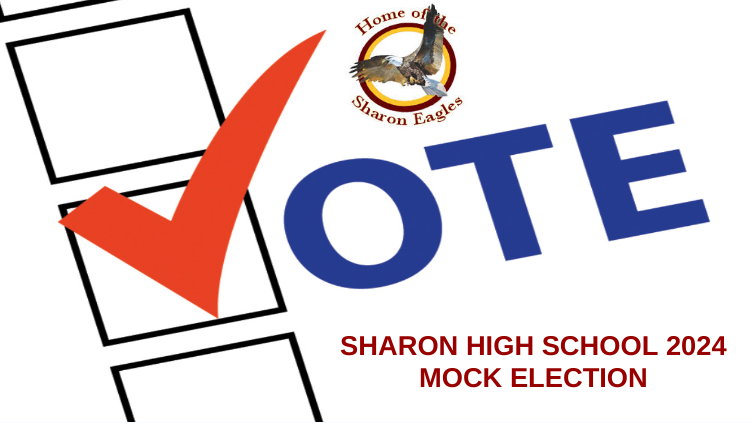
By William Guo
On November 5, 2024, Sharon High students from all grades voted in the presidential and senatorial elections, as well as on ballot questions about statewide topics such as MCAS requirements. But these voters were not headed to the polls—instead, they submitted their votes through a Google Form.
It was the Sharon High School Mock Election, which is run by SHS’s history department biannually in observance of the presidential and midterm elections. Started by AP Government teacher Mr. Sean O’Reilly in 2004, the Mock Elections has now been held eleven times.
O’Reilly first started creating mock elections after he moved from Washington, D.C., where he worked on multiple political campaigns. He saw mock elections as a way to inform the school community about their political views. “I like providing the results to the community so they can analyze the results and compare our community to the rest of the country,” O’Reilly explained.
For members of Sharon’s history department, including AP Government teacher Ms. Courtnay Malcolm, mock elections are about presenting students with a hands-on experience of the civics process. “Students really get an idea of what it means to participate in the [democratic] process and research some of the ballot initiatives… and understand what their civic duty is,” Malcolm said.
In the mock election, Sharon students voted overwhelmingly for the Democratic Party in the presidential and senate races. O’Reilly explained that this trend corresponds with factors such as education and religion. According to O’Reilly, education can be related to political preference: people with higher levels of education are more likely to be Democratic. Additionally, more religious voters are more likely to be conservative and Republican, and Massachusetts’ standing as one of the least religious states in the nation serves as a predictor of its Democratic ties.
Aside from general elections, five initiatives were put on the Massachusetts state ballot this year, with topics ranging from minimum wage to recreational drug use. All but two of these laws passed; the one most directly impacting Sharon students was the elimination of MCAS from graduation requirements. At SHS, 60% of students voted to eliminate MCAS requirements, along with 88% of staff.
Malcolm suspects that the outcome was expected given the unnecessary stress and restrictions on meaningful learning MCAS has been known to cause. “Seeing the anxiety and the stress that kids get when they have to take it over and over again [and] the time that’s taken out of class to actually administer the test… all that time dedicated to the test itself can be better spent on other things,” Malcolm explained.
Although it seems like a monumental change, Malcolm predicts that the elimination of the MCAS graduation requirement will have little effects on schools throughout the state. “I don’t think a lot of people in Massachusetts realize that we’re still going to have the MCAS [or its equivalent],” Malcolm said. “It’s just not going to be part of the graduation requirement.”
Reflecting on the mock election, O’Reilly hopes that students will become more interested in voting and their personal politics. “Voting ensures that the will of the people is the guiding principle of our government,” O’Reilly explained. “A big part of high school is figuring out who you are and how you fit into the world. I hope this project helped Sharon students on that journey.”
To view the full 2024 Mock Election results and analysis, click here.
